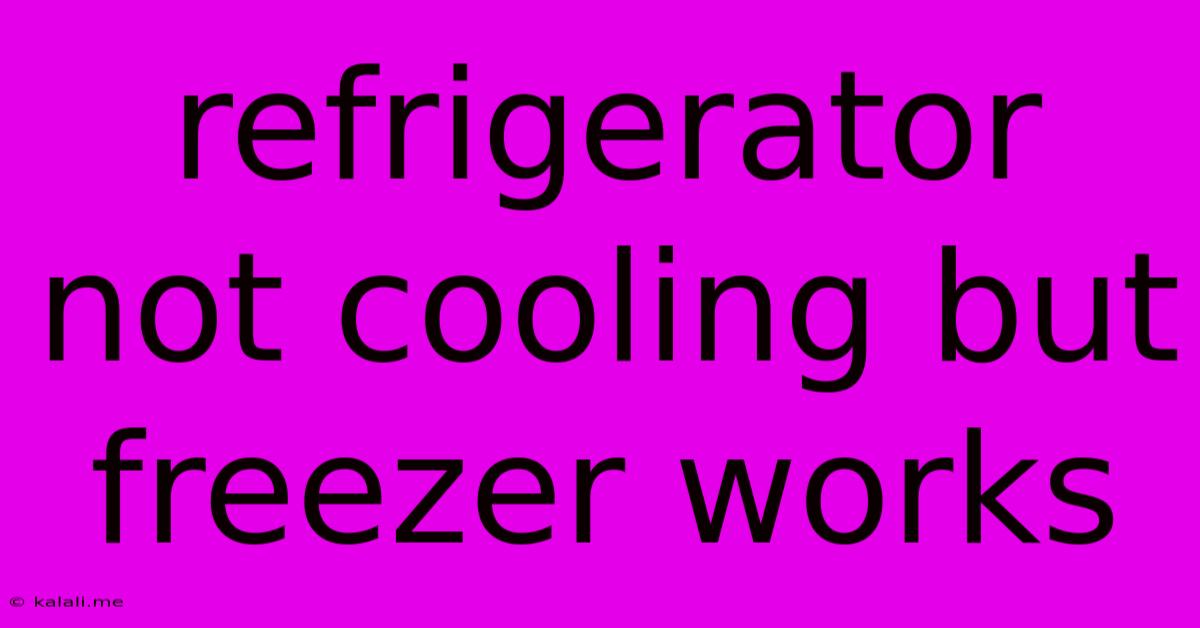Refrigerator Not Cooling But Freezer Works
Kalali
May 31, 2025 · 3 min read

Table of Contents
Refrigerator Not Cooling But Freezer Works: Troubleshooting Guide
Is your refrigerator not cooling properly, but the freezer is working just fine? This common problem can be frustrating, but often it's a relatively simple fix. This guide will walk you through the most likely causes and how to troubleshoot them. Before calling a repair technician, try these steps to potentially save yourself time and money. Understanding your refrigerator's cooling system is key to diagnosing the issue.
Understanding Your Refrigerator's Cooling System
Most refrigerators use a refrigerant cycle to cool. The refrigerant absorbs heat from the refrigerator compartment, transferring it to the freezer and then releasing it outside the unit. A malfunction in any part of this cycle can lead to a fridge that's not cooling, even if the freezer is functioning.
Common Causes and Troubleshooting Steps
Here's a breakdown of the most frequent culprits when your refrigerator isn't cooling but your freezer is working:
1. Temperature Control Settings
- Problem: The refrigerator temperature may be set too low, causing the system to prioritize freezing over refrigeration. Or, conversely, the temperature might be set too high.
- Solution: Check the refrigerator's temperature control dial or digital display. Make sure it's set to an appropriate temperature (typically between 35-38°F or 2-3°C). Experiment with slightly adjusting the setting and monitor the temperature over a few hours.
2. Faulty Door Seals
- Problem: Worn or damaged door seals allow warm air to enter the refrigerator, causing it to work harder and potentially leading to uneven cooling. This warm air influx forces the system to prioritize the freezer's cooling.
- Solution: Inspect the rubber seals around both the refrigerator and freezer doors. Look for cracks, gaps, or areas where the seal doesn't make good contact. A simple test is to close the door on a piece of paper; if you can easily pull it out, the seal needs replacing.
3. Clogged Condenser Coils
- Problem: Dust and debris buildup on the condenser coils (located usually at the back or bottom of the refrigerator) hinders their ability to release heat, reducing cooling efficiency. This often impacts the refrigerator more significantly than the freezer.
- Solution: Unplug the refrigerator and carefully vacuum the condenser coils. You can use a coil cleaning brush for better access. Clean coils allow for efficient heat dissipation, improving overall cooling performance.
4. Defrost Problems (Frost Build-Up)
- Problem: Excessive frost buildup on the evaporator coils (located in the freezer section) can restrict airflow, affecting the refrigerator's ability to cool effectively. This often happens if the defrost system malfunctions.
- Solution: If you have excessive frost or ice buildup, you may need to manually defrost the freezer. However, persistent frost buildup may indicate a faulty defrost system (defrost heater, thermostat, or timer) and will require professional repair.
5. Fan Motor Issues
- Problem: The refrigerator fan circulates cool air from the freezer to the refrigerator compartment. A malfunctioning fan will prevent proper air circulation, resulting in uneven cooling.
- Solution: Listen carefully near the freezer compartment. A humming sound might indicate the fan is operating, while complete silence suggests a problem. Replacing a faulty fan motor is best left to a qualified technician.
6. Refrigerant Leaks
- Problem: Low refrigerant levels due to leaks can drastically reduce cooling capacity. This often presents as a freezer working while the refrigerator struggles.
- Solution: Refrigerant leaks require professional attention. It's crucial to address leaks promptly to prevent further damage to the cooling system and avoid environmental concerns related to refrigerant gases.
When to Call a Professional
If you've tried these troubleshooting steps and your refrigerator is still not cooling properly, it's time to call a qualified appliance repair technician. Issues like refrigerant leaks, faulty components (compressors, defrost systems, etc.), and electrical problems require specialized knowledge and tools. Attempting to repair these issues yourself could worsen the problem and potentially void any warranty.
By systematically checking these common causes, you can often resolve a refrigerator cooling problem without needing expensive professional repairs. Remember safety first: always unplug the refrigerator before undertaking any maintenance or troubleshooting.
Latest Posts
Latest Posts
-
How To Find Heart Crystals Easily In Terraria
Jun 01, 2025
-
Why Did King James Remove Books From The Bible
Jun 01, 2025
-
Whats An Average Tempeture For Cpu Proximity Sensor
Jun 01, 2025
-
Mac Switch User At Login Screen Shortcut
Jun 01, 2025
-
What Level Can You Appraise Pokemon In Pokemon Go
Jun 01, 2025
Related Post
Thank you for visiting our website which covers about Refrigerator Not Cooling But Freezer Works . We hope the information provided has been useful to you. Feel free to contact us if you have any questions or need further assistance. See you next time and don't miss to bookmark.